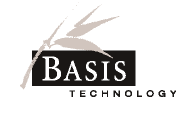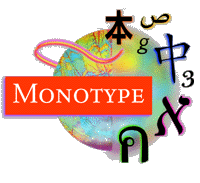Exhibitors Panel
Tex Texin (Moderator) - XenCraft
| Intended Audience: |
Managers, Software Engineers, Systems Analysts, Content
Developers |
| Session Level: |
Beginner, Intermediate |
UPDATE! Read the
Summary
Report on the IUC23 Exhibitor's Panel!
Vendors of tools, products and services for the
internationalization and localization markets will present the
latest advances in their technologies and methodologies and
describe the challenges that face the industry. See the
Invitation to Exhibit. The panel presentations
and presenters are as follows.

Tony O'Dowd, Alchemy
Software Development Ltd.
Organizations that execute a localization strategy must decide whether they
wish to internally develop their localization technology or license it from a
third party vendor. This "build vs. buy" decision can be challenging because
it requires organizations to balance easily quantified factors with strategic
and emotional factors that are difficult or impossible to quantify. The
decision is important, however, because it typically impacts both the nature
of the strategic initiative as well as its ultimate success in enabling
companies to penetrate new markets quickly and accelerate revenue growth
opportunities. While internally developed solutions will always play a role in
meeting their initial localization requirements, recent surveys reflect a
strong preference for third-party applications over custom solutions.
This presentation explores key financial issues relating to the build vs.
buy decision in an attempt to explain why almost 75 percent of companies would
prefer to license packaged applications or suites rather than develop their
own localization technology.
A key theme throughout the presentation is that organizations making the
build vs. buy decision can maximize shareholder value by focusing on the
localization technologies expected return on investment (ROI). It begins with
an overview of ROI analysis and then explores each of the three critical
factors that drive ROI: total cost of ownership (TCO), functional
capabilities, and project risk.
The presentation concludes that most organizations making the build vs. buy
decision cannot financially justify internally developed localization
technology, given the availability of packaged applications that are more
functionally robust, provide greater flexibility, offer a lower TCO, and
generate a higher ROI.

Arturo Quintero,
Moravia IT
As the 2003 Unicode conference is being hosted in the Czech Republic, it
seems fitting to draw a parallel between the highly technical theme of the
Unicode conference, and the Czech Republic, showing how Moravia, a company in
the Central European environment has grown from strength to strength since the
1990's to what is now a respected globalization company with worldwide offices
in the USA, Asia, Ireland and across Europe.
This presentation will cover following topics:
- The advantage of the large resource pool, existing in the country, of
highly educated motivated engineers and transforming these into today's
localization and globalization professionals.
- Challenges along the way.
- The advantages of multicultural backgrounds.
- Technologies available and major technological innovations introduced
during the years
- Aspects and difficulties of growing a company with Central European
roots into a global enterprise with a worldwide customer base.
Going forward, what future is there for the region? How is the country
positioned with the continuing challenges of the US and European value chains
taking into account the global technology recession and the growth of the
production and development opportunities in Asia. Closer to home, how does
Moravia shape its future in the industry, how it builds new capabilities and
creates new advantages in the technology area to enhance its product offering.

Thomas Emerson,
Basis Technology Corporation
This presentation will focus on issues in search and retrieval in Arabic
text. Mr. Emerson will provide a brief introduction to the Arabic language and
an overview of the challenges of processing Arabic text. Issues covered will
include a discussion of the complexities of search and retrieval of written
Arabic given that words frequently incorporate affixes and infixes indicating
verb aspect, object, conjugation, person, number, gender, and other syntactic
attributes which must be normalized before the text is ready for indexing,
keyword searches, or other text manipulation. Mr. Emerson will also discuss
the challenges to processing that occur due to written Arabic's inconsistent
use or absence of vowels. Finally, he will discuss the approach Basis
Technology took in designing its Rosette Arabic Language Analyzer (ARLA), a
morphological analyzer which normalizes Arabic text and performs basic
stemming by removing grammatical affixes (such as conjunctions, prepositions,
and pronouns) that can interfere with effective searching.

Kamal Mansour, Agfa
Monotype Corporation
Typography is the soul of Agfa Monotype. With roots dating back to the
1880s, Agfa Monotype represents a rich history of typographic innovations and
design and is still at the forefront of all things related to fonts.
Over the 100-plus years that we have been helping people communicate, Agfa
Monotype has provided multilingual typeface solutions used in nearly every
country. Based on our extensive international presence, we have created one of
the world's finest and most extensive font libraries supporting non-Latin and
extended-Latin scripts. The WorldType® Unicode-compliant font library has the
breadth and flexibility to fulfil any language-related needs, particularly
those with non-Latin requirements, by giving developers the option of
subdividing the fonts into smaller, more manageable modules based on
linguistic, regional or other specialized requirements. Agfa Monotype is also
the only company in the world that has produced fonts that provide full
Unicode™ 3.0 character set coverage (over 49,000 characters).
Beyond the vast multilingual support we offer, Agfa Monotype fonts and
technologies also proliferate throughout the office environment. Millions of
printers in use today all over the world contain type technology from the
company such as Agfa Monotype's patented Universal Font Scaling Technology™
and MicroType® compression technologies. Fast, high-quality text display on
memory-constrained devices such as cell phones, PDAs and TV set-top boxes is
achievable through Agfa Monotype iType®, a high-speed TrueType®-based font
engine.

Laurel Wagers,
Multilingual Computing, Inc.
MultiLingual Computing & Technology is the magazine that covers the areas
of language technology, translation, internationalization, localization,
global Web sites and international software development.
In this presentation, managing editor Laurel Wagers will talk about what is
happening at the magazine and about projects being planned. She will also
outline the editorial calendar for the next several issues and invite people
attending to contribute articles, reviews and ideas about what topics they
would like to see addressed in the magazine.
MultiLingual Computing & Technology will also be offering free one-year
subscriptions to people who attend IUC 23.
| 